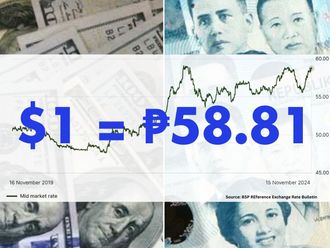
NEW YORK: Lower interest rates should lift Brazil’s economy out of its lull in the second half of the year, but inflation could be a headache in 2013, the International Monetary Fund said on Friday.
The IMF expects Latin America’s largest economy to grow at a more than 4 per cent annualised pace in the last quarter of 2012, up from the rate of about 1 per cent in recent months. Higher growth would be due to aggressive rate-cutting by the central bank, which stoked domestic demand, and a robust jobs market.
The 11-month cycle of rate cuts, the IMF said, appear adequate to help Brazil recover from its recent slowdown.
“Monetary settings are now more than sufficiently supportive,” the IMF said in its annual economic assessment for Brazil.
The IMF warned that an end to the ongoing rate cuts later this year and next will be key to keeping inflation on target in 2013.
Indeed, recent government data shows that consumer prices rose faster than expected in the month to mid-July, raising worries among analysts that price pressure could rebound strongly in coming months.
The Brazilian central bank has trimmed 450 basis points off its so-called Selic rate since August to increase the supply of money in the system and help revive sluggish growth.
Brazil’s government, which has argued for months that the rate cuts and other stimulus measures would lead to a rebound later in the year, welcomed the report. This is the first time, in fact, that Brazil has agreed to allow the IMF to publish the full report of its assessment, an annual review the agency undertakes of member countries.
Annual inflation in Brazil has been falling this year after hitting 6.5 per cent in 2011, the central bank’s official target ceiling. The official target range is 4.5 per cent, plus or minus two per centage points.
But the recent stimulus, as shown by the mid-month data, could already be causing prices to accelerate.
Inflation remains a touchy subject in a country scarred by years of hyperinflation in the 1980s and 1990s that drained the purchasing power of millions of Brazilians.
“There is always a concern to keep an eye on inflation and make sure it doesn’t threaten to reach the ceiling of the target band,” said Paulo Nogueira Batista, the IMF executive director for Brazil and eight other nations, speaking on behalf of the Brazilian government.
“But I don’t think this is the main risk right now. The downside risk is tilted toward low growth.”
The Brazilian government on Friday slashed its 2012 growth forecast to 3 per cent from 4.5 per cent previously, a move that underscores the depth of the slowdown in Latin America’s top economy.
Plenty of stimulus
Benign inflation so far in 2012 has allowed the central bank to bring one of the world’s highest interest rates to a record low of 8 per cent.
President Dilma Rousseff has also announced a flurry of stimulus measures such as tax breaks and subsidised loans to revive an economy that has stalled since the second half of 2011.
In a quarterly update to its World Economic Outlook, the IMF cut Brazil’s 2012 economic growth forecast to 2.5 per cent from about 3 per cent. Still, the global lender sees the Brazilian economy picking up sharply in 2013 to grow at 4.6 per cent.
Market analysts are more pessimistic. They expect the South American nation’s economy to grow below 2 per cent, a dramatic slowdown from 2.7 per cent in 2011 and 7.5 per cent in 2010.
The IMF urged the government commitment to keep a lid on spending to allow the central bank to continue cutting rates.
However, it warned that worsening European debt crisis is the main immediate risk to Brazil’s economy due to its negative effects on international financing and commodity prices.
“The external environment, notably the intensifying crisis in Europe, presents the most prominent downside risk in the near term,” the IMF said in the report.
The IMF acknowledged Brazil has plenty of international reserves and a solid financial system to withstand external shocks.
Despite strong banking supervision and sound financial system, the IMF said that rapid credit growth in Brazil is raising questions about the quality of credit.
It said Brazilian officials have started to strengthen their supervisory framework.












